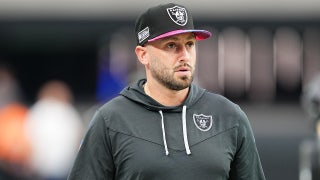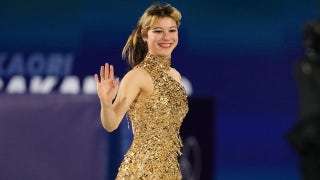He saved a young Cassius Clay when he was in trouble in England, convinced Sugar Ray Leonard that he could somehow overcome the fearsome Tommy Hearns. Angelo Dundee worked thousands of corners, and had just as many stories about fighters and the games they played in the ring.
The best work of his life, though, may have been selling a sport that was often tough to sell.
"He spread good will for a sport that often doesn't have a lot of good will," said retired AP boxing writer Ed Schuyler Jr. "What he did to promote boxing is his greatest contribution to the sport."
Dundee, who died Wednesday in Tampa, Fla., at the age of 90, was a master motivator who shared the world stage with the greatest fighters of his time. But it was his 53-year relationship with The Greatest and the way they shocked the world together that will always be his legacy.
Muhammad Ali didn't need anyone to tell him how to box. He came by it so naturally that there wasn't much Dundee was going to teach him in the ring to help him become a legendary fighter.
What he needed was someone in his corner shouting motivation, someone in his corner who always had his back.
Someone like Angelo Dundee.
"There was a time you couldn't tell Ali anything, but Angelo knew how to motivate Ali," promoter Bob Arum said. "Without Angelo, Ali doesn't get out of the "Thrilla in Manila." Without Angelo I think Joe Frazier destroys him. He needed someone like that in his corner."
So did Leonard, who was taking a beating in his epic first fight with Hearns in 1981. His face was swollen by the thunderous right hands landed by Hearns and he seemed baffled when Hearns began boxing him from the outside instead of trying to slug it out as he had in the early rounds.
After the end of the 12th round, Leonard came back to his corner, exhausted.
"You're blowing it, son!" Dundee yelled at him. "You're blowing it!"
Leonard would rally in the 13th round before finally stopping Hearns in the 14th round of a fight he was trailing on all three ringside scorecards. It was a masterful performance by a great fighter, but without Dundee in his face many believe Leonard would have come up short.
"He really knew how to motivate a guy," Arum said. "He was a good trainer, but he was a great, great cornerman. He was the greatest cornerman I've ever seen."
It wasn't all just motivation, though. Dundee wasn't above resorting to a few tricks in the ring if that was what it took to help his guy win.
British fight fans still talk about the night at London's Wembley Stadium in June 1963 when their great hope, Henry Cooper, floored Ali — who had yet to change his name from Clay — in the final seconds of the fourth round with a devastating left hook. Dundee managed to get his fighter to the corner when the bell rang, but Ali still didn't know where he was. Thinking fast, Dundee pointed out a small split in Ali's glove to the referee, sending British boxing officials in search of new gloves and gaining enough time for Ali to recover and stop Cooper in the next round.
Cooper would later become one of Dundee's good friends. Of course, Dundee had many good friends.
"The guy didn't have an enemy in the world," said matchmaker Bruce Trampler, who went to work for Dundee in Miami in 1971. "He was everyone's best friend."
Dundee traveled the world with Ali, and in the racially charged '60s was often the only white face in an otherwise black entourage. Ali felt secure with him in his corner, though he didn't often take his advice.
He may have changed the course of boxing history in Ali's first fight against Sonny Liston in 1964 when he refused Ali's demands after the fourth round to cut off his boxing gloves and let him quit because something on Liston's gloves was causing his eyes to burn terribly. He calmed down a frantic Ali, who came back to stop Liston at the end of the sixth round and become heavyweight champion for the first time.
Dundee, though, couldn't claim credit for Ali's greatest strategic move in the ring, when he used the "rope-a-dope" to stop George Foreman in the "Rumble in the Jungle." Though popular lore was that Dundee had the ring ropes loosened so Ali could lay against them and make Foreman tire himself out, Dundee had actually gotten the ropes tightened just before the fight began and was screaming at Ali to get off the ropes as Foreman unloaded punch after punch before finally running out of gas.
Dundee was still in relatively good health when he traveled with his son, Jimmy, to Louisville, Ky., last month for Ali's 70th birthday party. The aging fighter and his elderly trainer talked and posed for pictures, and Dundee reminisced about the past.
"I've had a lot of great fighters and a lot of great times," Dundee said then. "But the greatest time of my life was with Muhammad Ali."
Jimmy Dundee said the visit meant everything to his father, who was hospitalized with a blood clot shortly after returning home. He was later released and seemed to be recovering before having trouble breathing. He died surrounded by his children and grandchildren, a peaceful end to a life well lived.
"He had a ball. He lived his life and he had a good time," Jimmy Dundee said. "I'm so glad we went. It meant so much for him to see Muhammad again."
Dundee will be forever linked to Ali, and his death — which followed by just a few months the passing of Frazier — erases another link to an era long gone. Though Dundee will be remembered as Ali's trainer and cornerman, his son said he would also like him to be known as something else:
In the often brutal and cutthroat world of boxing, he stood out as an extraordinary ambassador for the sport. Anyone who met him was his friend, whether they were in his corner or across the ring.
To those who wondered why, Dundee always had the same reply:
"It doesn't cost anything more to be nice."








































